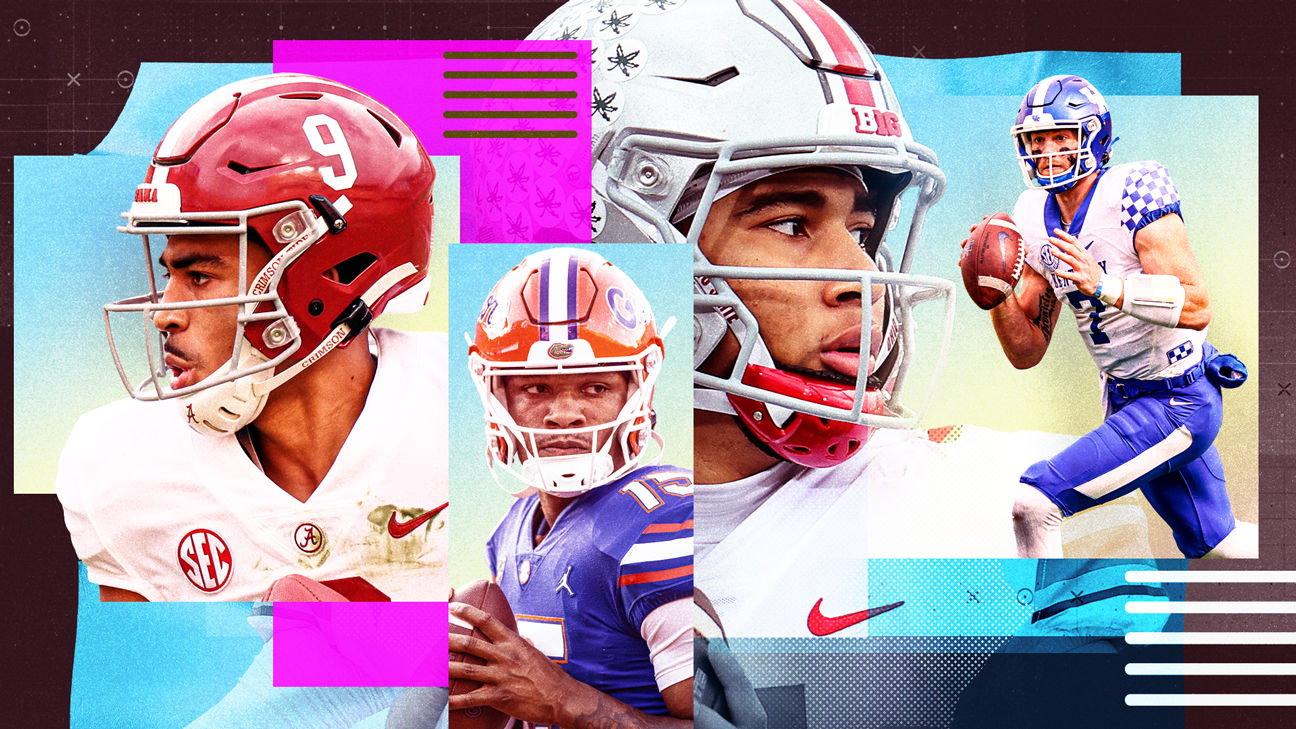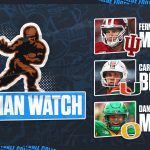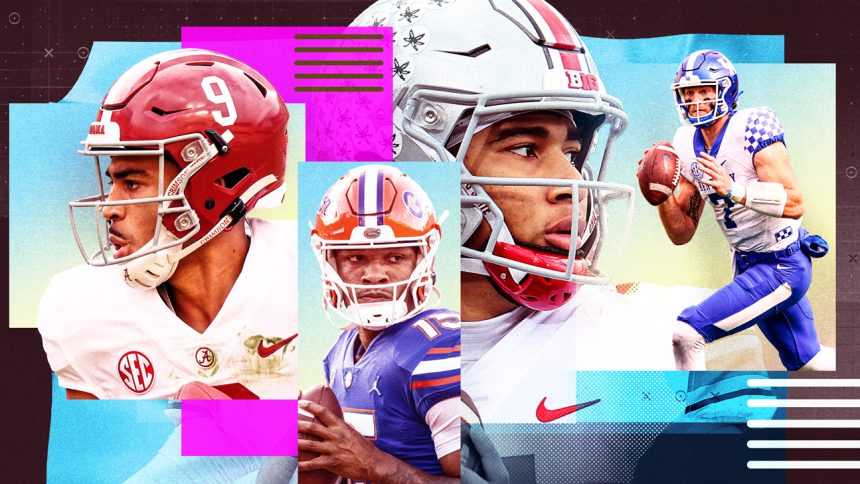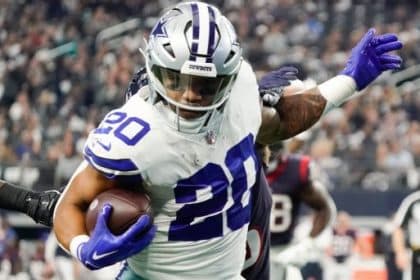
The 2023 NFL draft is coming up fast, and the first-round picture is becoming clearer and clearer. But why stop there? I’m going two rounds deep in my newest mock draft, projecting selections for the opening 63 picks.
There has already been a handful of trades involving picks in Round 1 or Round 2, including the Carolina Panthers‘ jump up to No. 1 overall. But I don’t think we’re done yet in that department, and I’m projecting two more trades. I also have five quarterbacks coming off the board in this mock, and you’ll see a bunch of cornerbacks and pass-catchers listed, as well.
Draft boards aren’t finalized, and there is still some work to do with this class before the clock starts April 27. But here is my current prediction of how the first and second rounds of the 2023 draft will play out. And for more on all 63 picks, check out our “SportsCenter” Mock Draft Special. Let’s jump in with my first pick, or you can skip ahead to Round 2.
![]() coverage:
coverage:
Reid’s seven-round mock
Bowen on top QB traits

ROUND 1
![]()
C.J. Stroud, QB, Ohio State
We know the Panthers are drafting a quarterback — they have been searching for a long-term fix and sent a big bag of assets to Chicago to jump up here in order to find it — but we still don’t know for sure which quarterback they want. We might not have the answer until the pick is announced, and I’m not sure Carolina even knows just yet. I projected Alabama’s Bryce Young here in my last mock draft, but I’m going with Stroud this time around. It could really go either way.
Stroud is the best pocket passer in the class, with outstanding accuracy to every level and a really good feel for reading the field. His 88.9 Total QBR last season was second in the country, and he threw 41 touchdown passes to just six interceptions. He should be an immediate upgrade and could have the Panthers challenging for the NFC South title in short order. But I’d like to see Carolina add a little more around him. It signed Adam Thielen, DJ Chark and Miles Sanders, but the trade up to No. 1 cost the team DJ Moore.
![]()
Bryce Young, QB, Alabama
Young is still my top-ranked quarterback, and there’s a decent chance he is on top of Houston’s board, too. The Texans had arguably the league’s worst pass game last season, with a 32nd-ranked QBR (26.0) and 28th-ranked completion percentage (60.8%). Young would be a big improvement over Davis Mills, thanks to his poise in the pocket, ability to hit any throw and really good composure under pressure. He can also create when things go south, evidenced by his 95.7 QBR outside the pocket last season (third in the FBS). A lot will be made of his 5-foot-10, 204-pound frame, but the rest of the package is special.
This is another team that still has work to do around its new QB, though. I like the Dalton Schultz addition, and Young played with John Metchie III at Alabama, but Houston is still missing that true WR1.
![]()
![]()
Projected trade: Colts aren’t taking chances
After the Bears traded the No. 1 pick, the Cardinals’ No. 3 pick became highly valuable. It’s apparent two quarterbacks will be drafted with the opening pair of picks, and the QB-needy Colts sit at No. 4. So any team that covets a potential franchise signal-caller better act fast, and moving up to No. 3 is the best bet.
In this scenario, it’s actually Indy that makes the move, sliding up one spot to block any other teams trying to nab a passer and securing its guy in the process. And for Arizona, this is the best-case outcome. The Cards drop only one spot to No. 4, can still draft a dominant defender and pick up something in the ballpark of a third-rounder (No. 79) and a future second-rounder along the way.
![]()
Anthony Richardson, QB, Florida
I’ve heard mixed messages regarding the Colts’ interest in quarterbacks not named Young and Stroud, but the veteran route just hasn’t worked for them. They’ve started each of the past five seasons with a different starting QB, and they scored the NFL’s fewest points in 2022 (15.8 per game). If either Richardson or Kentucky’s Will Levis is Indy’s guy, it can’t afford to stay at No. 4 and just hope things work out.
There is obvious risk with Richardson, and it’s certainly possible Gardner Minshew would be getting the Week 1 call. After all, Richardson has just 13 career starts and accuracy issues to work through, mainly stemming from poor footwork and still-developing touch. But you’d need to call in NASA to reach his sky-high ceiling. At 6-foot-4 and 244 pounds, Richardson ran a 4.43 in the 40-yard dash at the combine and has the strongest arm in this class. If he puts it all together, he could be a star in the NFL. New Colts coach Shane Steichen might be the guy to get him there.
According to ESPN Stats & Information, this would be the fourth time in the common draft era that quarterbacks go 1-2-3. The most recent occurrence came in 2021.
![]()
Will Anderson Jr., OLB, Alabama
Who is rushing the passer in Arizona right now? J.J. Watt retired, and Zach Allen is off to Denver. If new GM Monti Ossenfort wants to turn this ship around, he needs to find a dominant force off the edge who can get after the quarterback. Luckily for the Cards, they land the best one in the class despite moving back a spot. Anderson has real explosion to his game, getting on offensive tackles in an instant and then displaying the power to beat them one-on-one. He was extremely productive in college, posting 34.5 sacks and 66 tackles for loss over three years.
![]()
Jalen Carter, DT, Georgia
Seattle would be in an interesting spot here, and GM John Schneider and coach Pete Carroll would have some difficult questions to answer:
-
How high are they on Levis, and could they take advantage of the draft slot by selecting a quarterback of the future?
-
Does Texas Tech’s Tyree Wilson make sense, considering edge rushing is the team’s biggest need?
-
How does having the No. 20 pick impact what they do here, with Anderson being the only non-QB off the board?
But perhaps the biggest question is where they stand on Carter, who is probably the most talented player in the class but has some off-field concerns. He pled no contest to misdemeanor charges of reckless driving and racing after an arrest during combine week and is coming off a disappointing pro day in which he showed up out of shape. The Seahawks signed Dre’Mont Jones, but Carter could really change this defensive line with his game-breaking quickness and power on the interior. They just have to be comfortable with their homework.
![]()
Tyree Wilson, DE, Texas Tech
This pick has to be defense. Detroit was miserable in that department last season, and it was the reason it came up short in the playoff hunt. The Lions were bottom-three in yards allowed per rush (5.2), yards allowed per pass attempt (7.9), opponent QBR (56.0) and third-down defense (45.1%). Adding Wilson to a young edge-rushing contingent that already includes Aidan Hutchinson and James Houston could create real conflict for opponent pass-protectors, though. He had seven sacks in 2022 for a second straight year, and his arm length and pure power jump out on tape.
I also considered the secondary with a handful of top-tier cornerbacks on the board, but the Lions have been aggressive there by signing Cameron Sutton, Emmanuel Moseley and C.J. Gardner-Johnson in free agency. Detroit is back on the clock at No. 18 and has a pair of second-rounders.
![]()
Devon Witherspoon, CB, Illinois
Witherspoon smothers receivers with his quickness and instincts in coverage, and he allowed a 5.2 QBR when targeted last season, which ranked second in the nation. Opponents completed just 30.4% of passes thrown in his direction for an average of 3.3 yards and zero touchdowns, all of which ranked in the top six nationally. The Raiders have a lot of holes right now, but corner is a big one. They signed Brandon Facyson, but this is a team that allowed 7.3 yards per attempt last season, among the worst in the NFL.
For those wondering whether Las Vegas could jump on Levis if he’s available, I’ll just say I’ve heard buzz that it isn’t interested in using a high pick on a QB unless Young or Stroud were miraculously available. Bringing in Jimmy Garoppolo fills the void, and the Raiders can always add a passer later in the draft or go hunting for a younger option next year.
![]()
Christian Gonzalez, CB, Oregon
I thought about Iowa edge rusher Lukas Van Ness for Atlanta, given it ranked worst in sacks in 2021 and second worst in 2022. That said, the pass defense allowed a 67.8% completion percentage (28th) and lacks a long-term option opposite A.J. Terrell at corner. Casey Hayward is entering the final year of his deal and turns 34 in September. Gonzalez is 6-foot-1 and has 4.38 speed and plenty of on-ball production, bringing down four interceptions last season.
![]()
Peter Skoronski, OT/G, Northwestern
The Bears could address the edge rush — perhaps with Van Ness — after closing out the 2022 season at the bottom of the league in sacks. However, they need to maximize quarterback Justin Fields, and that means protecting him. Chicago allowed a sack on 11.5% of dropbacks last season, the highest rate we’ve seen since the Raiders’ 12.6% in 2006. I like the Nate Davis addition at guard, but Teven Jenkins probably isn’t the answer at tackle opposite Braxton Jones. Jenkins is a better fit on the interior. And while there are concerns about Skoronski’s 32¼-inch arm length, his quickness, balance and snap in his hands stand out.
1:32
See for yourself why Peter Skoronski is a top NFL prospect
Check out highlights from Northwestern offensive lineman Peter Skoronski as he gets ready to hear his name called in the 2023 NFL draft.
![]()
Lukas Van Ness, DE, Iowa
Van Ness has the arm length and footspeed to dominate off the edge, and I love the versatility that comes with his game. He’s arguably even more effective rushing the passer as a 3-technique. Philadelphia lost Javon Hargrave and re-signed Fletcher Cox to only a one-year deal, so I could see Van Ness and Jordan Davis wreaking havoc from the interior. GM Howie Roseman loves building up the trenches, and Van Ness can make an immediate impact there after 14 sacks over two seasons at Iowa.
I still think Texas running back Bijan Robinson would be interesting in this offense, even though that isn’t a position Roseman prioritizes early in the draft. He’s a top-five talent in this class and fits seamlessly in this run-heavy offense. But Kenneth Gainwell looked solid at the end of last season, Rashaad Penny will be a big contributor if he stays healthy and they could still add a veteran like Ezekiel Elliott.
![]()
Jaxon Smith-Njigba, WR, Ohio State
It’s not often a team uses a top-20 pick on a wide receiver in back-to-back years. In fact, you need to go back to 2003 to ’05 for the last time, when the Lions actually did it three times in a row. But there’s no arguing that Tennessee needs playmakers, even after selecting Treylon Burks last year. The Titans’ top four wideouts combined for 1,446 yards and six touchdowns last season; A.J. Brown — whom Tennessee traded away — surpassed those numbers on his own.
Smith-Njigba barely played in 2022, but he’s just one year removed from cracking 1,600 receiving yards. He’s such a good route runner, creating separation with high-end acceleration out of his breaks and hauling in passes with soft hands. He’d be an immediate favorite for quarterback Ryan Tannehill. Speaking of Tannehill, I wouldn’t rule out Tennessee drafting Levis as the future franchise signal-caller, especially since Malik Willis struggled in his rookie year. And I think Ohio State offensive tackle Paris Johnson Jr. could make a lot of sense, too.
![]()
Nolan Smith, OLB, Georgia
If Smith-Njigba were still on the board, I would have projected him as the pick. I already mentioned that Houston is seeking pass-catchers for its new QB (Young in this scenario). But let’s not discount how bad the defense was last season. It gave up 5.7 yards per play (26th) and was 27th in ESPN’s defensive efficiency rating. Smith is a great fit here because he can get after the quarterback as an edge rusher on passing downs or drop into an off-the-ball role on early downs. A torn right pectoral muscle limited him to eight games last season, but his explosion was on full display at the combine; he ran a 4.39 in the 40-yard dash at 238 pounds and jumped 41.5 inches in the vertical. He will be even more effective off the edge once he expands his pass-rush move arsenal, too.
![]()
Paris Johnson Jr., OT, Ohio State
If Aaron Rodgers is indeed coming to the Big Apple, he’ll need some protection improvements. Mekhi Becton hasn’t finished a game over the past two seasons, missing time with right knee injuries. Duane Brown turns 38 this season. Alijah Vera-Tucker is coming off a triceps injury and Max Mitchell has played only 328 career snaps. If Johnson is still on the board, it’s an easy pick. He has experience both inside and outside, and he is an easy mover with a 6-6, 313-pound frame. If Johnson isn’t on the board, I think Georgia’s Broderick Jones could be an answer, too.
![]()
![]()
Projected trade: Bucs pounce on a QB
There are a handful of teams in the middle part of Round 1 that would love to land one of the top four quarterbacks, including the Buccaneers. So with Levis sliding a bit here, I bet Tampa Bay would jump at the chance to get ahead of Washington and nab him. Patriots coach Bill Belichick is always open to a trade-back opportunity, so this makes a lot of sense all around. To get it done, I think the Buccaneers would have to surrender the No. 19 selection, a third-rounder (No. 82) and one of their two fifth-rounders (No. 153).
![]()
Will Levis, QB, Kentucky
Welcome to the post-Tom Brady era on the Gulf Coast. The Buccaneers drafted Kyle Trask in Round 2 in 2021 and signed Baker Mayfield to a one-year deal this March, but neither is a surefire solution to the sudden void under center. Trask has nine career pass attempts, and Mayfield is set to wear his fourth jersey in the past three years. Levis has some stuff to work on — namely his footwork and turnover avoidance — but he has the physical traits to be a franchise quarterback. He comes from a pro-style offense, has a massive arm and can tuck and run with physicality. And with Mayfield and Trask on the roster, Tampa Bay doesn’t have to rush him into the starter’s chair right out of the gate.
![]()
Myles Murphy, DE, Clemson
The Packers could be in transition this season if Rodgers does end up with the Jets, and they will have to get Jordan Love some help. Allen Lazard and Robert Tonyan signed elsewhere, which leaves the receiving group light. So yes, I could see Green Bay going in that direction. But there should also be plenty of pass-catching options on Day 2, and Murphy would be a problem for opponents off the edge of the defense. The Packers’ 34 sacks tied for 27th last season, and Rashan Gary is coming off a torn ACL. Murphy can drive back blockers, use his great bend to turn the corner and then close on the quarterback with burst. He put together 14 sacks and 23 tackles for loss over the past two seasons.
![]()
Joey Porter Jr., CB, Penn State
Porter is an outstanding press corner whose instincts, body control and physicality helped him to 11 pass breakups last season. He also limited opponents to 3.7 yards per pass attempt thrown in his direction, good for fifth in the country. The Commanders could use that type of shutdown corner, even though Porter had just one interception over four seasons at Penn State. He’d have an instant impact opposite Kendall Fuller.
![]()
Broderick Jones, OT, Georgia
Pittsburgh brought in Isaac Seumalo this March to shore up the interior offensive line, but there are still questions at offensive tackle. And protection is key when you have a young QB running the offense. Jones allowed zero sacks over 15 starts last season, showcasing quick feet and explosive upper-body power for the national champion Bulldogs, and he’d be a good value get at this point in the draft. Jones would also help open lanes for Najee Harris in the run game.
![]()
Bijan Robinson, RB, Texas
Fans will question just about any landing spot for Robinson because of his position, but consider how heavily the Lions lean on the run and what Robinson can do for an offense. We’re talking about a top-five talent in this class who can break free with burst through the hole, make defenders miss with his strength and haul in passes with his reliable hands. Jamaal Williams is gone to New Orleans, and D’Andre Swift has struggled to stay healthy and is entering the final year of his contract. Yes, Detroit signed David Montgomery, but he has rushed for 100-plus yards just three times over the past two seasons. Robinson had only three games under 100 rushing yards last year.
According to ESPN Stats & Information, this would be the highest a running back has been drafted since the Giants took Saquon Barkley at No. 2 in 2018. But Robinson is special. Other options for Detroit include tight end or continuing down the defensive rebuild path, but with four picks in the first two rounds, it can afford to make this luxury selection and fill some other holes down the road.
![]()
Darnell Wright, OT, Tennessee
Trent Brown turns 30 this offseason, Isaiah Wynn is still unsigned, and Riley Reiff isn’t a long-term fix at right tackle. And when your quarterback turns in a league-low 4.1 QBR when pressured, you’d think getting him some more protection would be a priority. So landing Wright at No. 19 after the trade-back works on a lot of levels. Wright allowed just one sack last season, thanks in part to his great balance and 6-5, 333-pound frame. He’d also help spring running back Rhamondre Stevenson as one of the best run-blockers in the class. I considered Boston College receiver Zay Flowers, but while pass-catcher is a need, right tackle is a bigger one.
![]()
Zay Flowers, WR, Boston College
I wouldn’t be surprised if Seattle continued replenishing the defensive line depth chart here, and I also suspect it would give Tennessee quarterback Hendon Hooker a long look as a future starter. I kept coming back to Flowers, who fits with the Seahawks as a third receiver behind DK Metcalf and Tyler Lockett. He has 4.42 speed to stretch the field and the open-field elusiveness to turn underneath throws into big gains. This is another team that has two second-round picks, and it could result in a second straight outstanding draft for Seattle.
![]()
Calijah Kancey, DT, Pittsburgh
The Chargers still haven’t cleaned up their run defense — they finished dead last in yards allowed per rush at 5.4 in 2022. Kancey is undersized at 281 pounds, but he has explosive power. Run defense woes aside, I really like this fit because of Kancey’s upside as a pass-rusher. We’ve seen Chargers coach Brandon Staley have success with Aaron Donald as an interior rusher when he was the Rams’ defensive coordinator, and while Kancey is not Donald, he plays a similar style as a penetrating 3-technique with take-off burst. Kancey also ran the fastest 40-yard dash time for a defensive tackle since 2006 at 4.67 seconds, and he had 14.5 sacks and 28.5 tackles for loss over the past two seasons at Pitt.
Wide receiver is also an obvious consideration, after Los Angeles lost Keenan Allen and Mike Williams for extended periods of time last season. Perhaps TCU’s Quentin Johnston or USC’s Jordan Addison makes sense.
![]()
Quentin Johnston, WR, TCU
Speaking of Johnston and teams that need wide receivers, I like the idea of the big 6-3 receiver in new coordinator Todd Monken’s offense. Johnston is still refining his route running, but he has a big catch radius, can make plays in the vertical pass game and will pick up chunks of yardage after the catch. The Ravens averaged 12.2 yards per catch on throws to wideouts last season (23rd in the NFL), so having a player like Johnston on the outside could take the offense to another level.
There’s also the question of who is throwing the passes in 2023. The Lamar Jackson situation is far from settled, and if Baltimore does end up trading Jackson, this is another spot where Hooker could be in play. But if Jackson is back, the Ravens need to focus on getting him more weapons on the perimeter.
![]()
Hendon Hooker, QB, Tennessee
The Vikings have quietly been putting in some work on this QB class. Despite the team’s 13-win season, Kirk Cousins was just 23rd in QBR at 49.9. Plus, he’s turning 35 this summer and will be entering the final year of his deal. Sitting behind Cousins for a year to learn the pro game and fully recover from a torn ACL could be the perfect setup for Hooker, who led the nation in QBR last season before the injury (89.5).
Hooker is accurate to every level of the field but really thrives throwing deep. Some scouts might be wary of drafting a 25-year-old QB, but he has the talent to lead an NFL offense. I’ve talked to folks with a few teams that even have Hooker above Levis on their internal boards. He has interviewed really well this spring, and the tape is phenomenal. Alternatively, Minnesota could try to get another receiver alongside Justin Jefferson, go back to the cornerback well or bring in another big tight end.
![]()
Dalton Kincaid, TE, Utah
Trevor Lawrence has excelled throwing to bigger targets, dating back to his Clemson days. And while the Jaguars franchise-tagged Evan Engram, they could look to add another tight end to the offense — especially if that tight end is 6-4 and just caught 70 balls for 890 yards and eight TDs last season. Kincaid accelerates away from coverage, brings down 50-50 balls and tacks on yards after the catch. Why Kincaid over Notre Dame’s Michael Mayer? Mayer is the better blocker, but Kincaid is the more explosive pass-catcher. He’s a seam-stretcher who would fit perfectly in this Jacksonville offense.
![]()
Emmanuel Forbes, CB, Mississippi State
Expected a receiver? I nearly went with Addison here. But there are other needs, including cornerback, and receiver can be addressed later. Adoree’ Jackson, Darnay Holmes, Amani Oruwariye and Bobby McCain are under contract only through 2023, and the Giants tied the Raiders for fewest interceptions in the NFL last season with six. That’s how many Forbes had on his own at Mississippi State in 2022! And he picked off 14 passes over three seasons, including six returned for touchdowns.
Forbes is lean at 6-1 and 166 pounds, but he has great speed and fantastic instincts in coverage. The Giants blitzed more than any other team last season (42%) but didn’t have many ballhawks in the secondary to take advantage. Forbes would feast on mistakes forced by that pressure.
![]()
Michael Mayer, TE, Notre Dame
Dalton Schultz out, Mayer in. The latter is the most complete tight end in this draft class and could be a plug-and-play starter as Dak Prescott‘s new security blanket. At 6-5 and 249 pounds, Mayer is a legit blocker who would provide Tony Pollard with more running lanes. And while he’s not much of a vertical threat, his excellent ball skills would open up the offense at the intermediate level. Mayer posted back-to-back seasons with at least 800 receiving yards and seven touchdowns, and he’s a bulldozer after the catch.
![]()
Jordan Addison, WR, USC
Addison uses his speed, route-running savviness and high-end instincts to separate from coverage, and he’d fit nicely with this Buffalo offense. Despite a 5-11 frame, he can make tough catches down the field. And while Stefon Diggs is here to stay for a bit, the Bills need to find more pass-catchers. Gabe Davis is under contract for only one more year, and the depth chart beyond those two is lackluster. Addison had 159 catches for 2,468 yards and 25 touchdowns over the past two seasons (the first of which was at Pitt).
1:37
The plays that have scouts excited about Jordan Addison
Check out some of Jordan Addison’s best plays at Pittsburgh and USC.
![]()
Deonte Banks, CB, Maryland
The top two tight ends are off the board, which means we’re looking at the other side of the ball for the Bengals. The secondary already lost Jessie Bates III, and Eli Apple is still unsigned. Chidobe Awuzie has only one year left on his deal. So padding the defense with an explosive and physical press corner would be a win for Cincinnati this late in Round 1. Banks had only one interception last season, but he broke up 10 passes and showed off his physical traits at the combine by finishing in the top three at the position in the 40-yard dash, vertical jump and broad jump.
![]()
Adetomiwa Adebawore, DE/DT, Northwestern
Marcus Davenport, David Onyemata and Shy Tuttle signed elsewhere in free agency, and this Saints defensive line wasn’t exactly a strength even before those subtractions. Last season, New Orleans was last in the NFL in pass rush win rate (28.5%) and 25th in run stop win rate (28.0%). Adebawore can help in both areas. He’s a hybrid edge rusher and 3-technique who proved disruptive last season with five sacks and 10.5 tackles for loss. He has a powerful upper body, and I think he can be an every-down starter in the NFL early in his career. New coordinator Joe Woods could move Adebawore around this defense and let him impact multiple facets of the game.
![]()
Will McDonald IV, DE, Iowa State
Let’s double-dip on pass-rushers for the Eagles in Round 1 (they landed Van Ness at No. 10). It was one of the team’s biggest strengths last season with an NFL-high 70 sacks, but Philly could use more depth there. Brandon Graham re-upped with the Eagles, but he’s 34 years old. Robert Quinn might be out the door after he was acquired last November.
With long arms and plenty of explosion, McDonald hunts quarterbacks. He picked up 27 sacks and 35.5 tackles for loss over the past three seasons and could be a Day 1 contributor as a rotational pass-rusher before developing into a starter off the edge to replace some of the aging players in this unit.
![]()
Felix Anudike-Uzomah, DE, Kansas State
Anudike-Uzomah is a speed rusher who can beat double-teams and pursues the QB with relentless effort. He tallied 19.5 sacks and 30.5 tackles for loss since becoming a starter with the Wildcats in 2021. The Chiefs were second in sacks last season with 55, but much of their production came either from the blitz or Chris Jones on the interior. Adding Anudike-Uzomah to an edge-rush group that already includes George Karlaftis and Charles Omenihu should create a little more balance.
As an aside, I bet the Chiefs take a look at their wide receiver board when they’re on the clock, too. Tennessee’s Jalin Hyatt could be a fun deep-threat addition to this offense.

ROUND 2
![]()
Mazi Smith, DT, Michigan
Pittsburgh is typically strong up the middle, and it already has Cameron Heyward and Larry Ogunjobi in place. But considering the electrifying rushing attacks that the Steelers face in their division, securing depth at defensive tackle isn’t a bad call. At 6-foot-3 and 323 pounds, Smith’s game is all about power, and he’s a plug-and-play nose tackle in the NFL.
![]()
Jalin Hyatt, WR, Tennessee
I hinted that Houston needs more pass-catchers earlier, and it gets lucky that the speedy Hyatt is still on the board at No. 33. He tracks the deep ball extremely well, and he has the explosion to eat up cushion in coverage and fly by defenders. Hyatt averaged 18.9 yards per catch last season en route to 1,267 total receiving yards (fifth in the FBS).
![]()
Jahmyr Gibbs, RB, Alabama
James Conner is under contract, but the Cards’ offense is at its best when it rolls out multiple backs who can do a lot of different things. Gibbs is a shifty runner with the suddenness to make defenders miss and a devastating second gear to run away from them once he hits daylight. He not only ran for 926 yards and seven touchdowns in 2022, but also caught 44 passes.
1:01
Jahmyr Gibbs’ NFL draft profile
Check out the best highlights that contributed to a stellar college career for Alabama’s Jahmyr Gibbs.
![]()
Julius Brents, CB, Kansas State
Brents stood out at the Senior Bowl and then wowed during combine drills, posting wild 41.5-inch vertical and 11-foot-6 broad jumps. He is a solid press corner who takes away receivers with his long arms and pulled down four interceptions in 2022. And the Colts traded away Stephon Gilmore, opening up a spot on the cornerback depth chart.
![]()
Kelee Ringo, CB, Georgia
The Rams are on the board here for the first time, and after they dealt away Jalen Ramsey, there’s a gaping hole at cornerback. Ringo has speed for days, but he still has to work on his recognition skills in coverage. He picked off four passes and broke up 18 over two seasons at Georgia.
![]()
Keion White, OLB, Georgia Tech
GM John Schneider is putting a lot of energy into the pass rush this offseason, and even after using one of the team’s two first-rounders on an interior rusher (Jalen Carter), this pick keeps filling the edge-rush cupboard and comes with great value. I see power and quickness in White’s game, and it’s no surprise that he ended up with 7.5 sacks last season.
![]()
Bryan Bresee, DT, Clemson
The Raiders got run over last season, surrendering 4.5 yards per carry and 20 rushing TDs — both bottom-10 numbers. Bresee is dominant in that phase of the game, using upper body strength to shed blockers and bring down ball carriers.
![]()
O’Cyrus Torrence, G, Florida
Let’s get Stroud some protection on the interior. Torrence allowed just two sacks over 47 starts — many of which came at Louisiana before transferring — and he rarely gives up ground to pass-rushers. He’d also help open things up for Miles Sanders in the run game, as he shows the ability to control linemen and move them laterally.
![]()
Darnell Washington, TE, Georgia
If you like tight ends with a lot of traits, Washington is your guy this year. He played behind Brock Bowers at Georgia, but the 6-foot-7, 264-pounder has a massive catch radius and ran a 4.64 in the 40 at the combine. He’s extremely strong and has long arms and huge hands. The Saints brought back Juwan Johnson, but they still need talented targets for Derek Carr — who often connected with a toolsy tight end in Darren Waller in Las Vegas.
![]()
Drew Sanders, ILB, Arkansas
Our first inside linebacker is finally off the board. Tennessee signed Azeez Al-Shaair to replace David Long Jr., but Sanders does a little bit of everything. He had 111 tackles, 9.5 sacks, 16 tackles for loss, 2 forced fumbles, 10 run stops and an interception last season. His versatility, instincts and burst would be welcomed on a defense that gave up 5.4 yards per play last season (19th).
![]()
Joe Tippmann, C, Wisconsin
The Jets have back-to-back picks here after they sent receiver Elijah Moore to Cleveland, and I have them continuing the offensive line reload with the first one. They have a hole at center, and Tippmann, who plays with great awareness, will drop an anchor against bull rushers and is rangy as a run blocker.
![]()
Brian Branch, S/CB, Alabama
Branch has slid a bit after an underwhelming combine performance, and he probably fits best in the NFL as a nickel corner. But he’s a complete player, and it shows up on the stat sheet. Defensive coordinator Jeff Ulbrich could get creative with Branch, moving him around and letting him impact the game in a variety of ways.
![]()
Keeanu Benton, DT, Wisconsin
This should be an edge rusher, but there just isn’t one with any sort of value on the board. Maybe Atlanta can move back a little bit. But if not, Benton has the quickness and strength to rush on the interior and stuff the run. He’d provide depth behind Grady Jarrett and David Onyemata before turning into a starter.
![]()
Luke Musgrave, TE, Oregon State
After going defense in Round 1, the Packers have to find an offensive playmaker in Round 2 — no matter who is playing QB. Musgrave was limited to three games last season and didn’t really turn in eye-popping numbers in college, but one watch of the tape shows his immense upside. The 6-foot-6 tight end can make contested catches and stretch the field, and he’d be a good replacement for Robert Tonyan.
0:33
Luke Musgrave’s NFL draft profile
Check out the best highlights that contributed to a stellar college career for Oregon State’s TE Luke Musgrave.
![]()
DJ Turner, CB, Michigan
Turner has a great combination of speed and fluidity. He ran a scorching 4.26 in the 40-yard dash (fastest at the combine this year), and he can mirror receivers’ every move. Jonathan Jones re-signed in New England, but there’s a need for more playmakers in the secondary. Turner had three interceptions and 18 pass breakups over the past two seasons.
![]()
John Michael Schmitz, C, Minnesota
Nick Gates and Chase Roullier have both dealt with injuries, and Schmitz brings power and awareness to the center position. The Commanders were 29th in run block win rate at center last season (65.0%), and gave up 48 total sacks (seventh-most).
![]()
Jack Campbell, ILB, Iowa
Campbell posted more than 120 tackles in each of the past two seasons, and he’d compete for snaps with Alex Anzalone and Malcolm Rodriguez in the middle of this defense undergoing a big overhaul.
![]()
Cam Smith, CB, South Carolina
The Steelers replaced Cameron Sutton with Patrick Peterson, who turns 33 this July. Cornerback is a big question mark for them this season, and Smith utilizes his high-end instincts and speed to jump routes and come away with interceptions. He had six over four seasons and joins a team that tied for the league-lead there last season.
![]()
Anton Harrison, OT, Oklahoma
The Buccaneers allowed the fewest sacks in 2022 (22), but at least part of that was because Tom Brady got the ball out faster than anyone else in the league (2.45 seconds on average). It’ll be different in 2023 with either Baker Mayfield, Kyle Trask or — in this case — Levis under center. There’s a hole opposite Tristan Wirfs after the Bucs released Donovan Smith, and Harrison flashes starter-level power and body control.
![]()
Dawand Jones, OT, Ohio State
Miami has to wait until No. 51 because it forfeited its first-rounder due to tampering violations. Jones is a massive 6-foot-8, 374-pound right tackle with long 36⅜-inch arms. And despite the size, he moves really well and allowed zero sacks in 12 starts last season. He would give the Dolphins another reliable tackle in their high octane offense.
![]()
Steve Avila, C/G, TCU
Charles Cross and Abraham Lucas looked great as rookies at tackle, but the Seahawks still have work to do on the interior. Avila’s technique and awareness pop on tape, and at 6-foot-4 and 332 pounds, he’s a wall in the middle of the offensive line.
![]()
Zach Charbonnet, RB, UCLA
The Bears brought in D’Onta Foreman with David Montgomery off to Detroit, but I like the value on Charbonnet at this point in Round 2 as another contributor in the run game. He’s a patient runner with good contact balance and can be a three-down back in the NFL, even though he lacks breakaway speed.
![]()
Brenton Strange, TE, Penn State
I dug into Strange’s tape recently, and he’s one of the most underrated players in this class, despite mediocre production and combine results. He accelerates really well and can stretch the seam, and he is competitive as an in-line blocker. Justin Herbert would love finding the 6-foot-4 target downfield for big gains.
![]()
Sam LaPorta, TE, Iowa
Yup, another tight end. LaPorta makes it six in the first two rounds, which would tie the common draft era record set in 1974. But this class is that good. LaPorta was consistent at Iowa, catching 153 passes over four seasons for 1,786 yards and five scores. He has speed down the seam and tempos his routes effectively. LaPorta could step in for T.J. Hockenson, who was traded to Minnesota at the deadline last season.
![]()
Tyrique Stevenson, CB, Miami
The Jags allowed 7.5 yards per attempt on passes thrown outside the numbers last season, 26th in the NFL. They need more playmakers at corner beyond Tyson Campbell and Darious Williams. Stevenson picked off a pair of passes last year, and he has the burst and strength to be effective in press.
0:44
Tyrique Stevenson’s NFL draft profile
Tyrique Stevenson’s NFL draft profile
![]()
Josh Downs, WR, North Carolina
The Giants went another route in Round 1, but they aren’t bypassing the receiver need here. Downs is undersized at 5-foot-9 and plays out of the slot, where New York already has plenty of options. But he plays with explosion and changes directions really well in the open field. Downs put together back-to-back seasons with more than 1,000 receiving yards and can help Daniel Jones right out of the gate.
![]()
Trenton Simpson, ILB, Clemson
Despite re-signing Leighton Vander Esch, Dallas could look to add to the linebacker corps. Simpson is a good value pick for the Cowboys here, and he brings versatility, man coverage skills and range against the run.
![]()
Riley Moss, CB, Iowa
Moss is instinctive and makes plays on the ball. In fact, he had 11 interceptions and broke up 23 passes over his 54-game college career. Moss fits best in zone looks, which Buffalo ran 60% of the time last season (10th most), and the Bills could use depth at the position. If things play out like this, it would be the first time Iowa sent four prospects to the first two rounds in the common draft era, per ESPN Stats & Information.
![]()
Matthew Bergeron, OT, Syracuse
The Bengals made a big splash in signing Orlando Brown Jr., but with Jonah Williams requesting a trade and La’el Collins coming off a left knee injury, getting more protection for Joe Burrow on Day 2 makes quite a bit of sense. Bergeron is quick and smooth getting set but still has some inconsistent footwork.
![]()
Byron Young, DE, Tennessee
The Bears had just 20 sacks last season, worst in the NFL, and bringing in Young would get them going in the right direction. He had seven sacks in his final season at Tennessee, and his 36 pressures tied for 22nd in the nation. He quickly re-directs and has an explosive lower body, but he’s still raw when it comes to technique.
![]()
Antonio Johnson, S, Texas A&M
The Eagles lost Marcus Epps and C.J. Gardner-Johnson, so there are some gaps at safety (though Philly did add Terrell Edmunds). Johnson might be the best pure safety in the class, with a great ability to read the offense and the footspeed to close on the ball. The on-ball production should come; he has the traits but only picked off one pass in college.
![]()
Jonathan Mingo, WR, Ole Miss
Let’s close out Round 2 with a vertical route runner for Patrick Mahomes. Mingo ran a 4.46 in the 40-yard dash at the combine, but he tracks the deep ball well and can find his way behind the defense. The Chiefs lost JuJu Smith-Schuster and Mecole Hardman, so they’d be wise to get a talented pass-catcher on Day 2.










